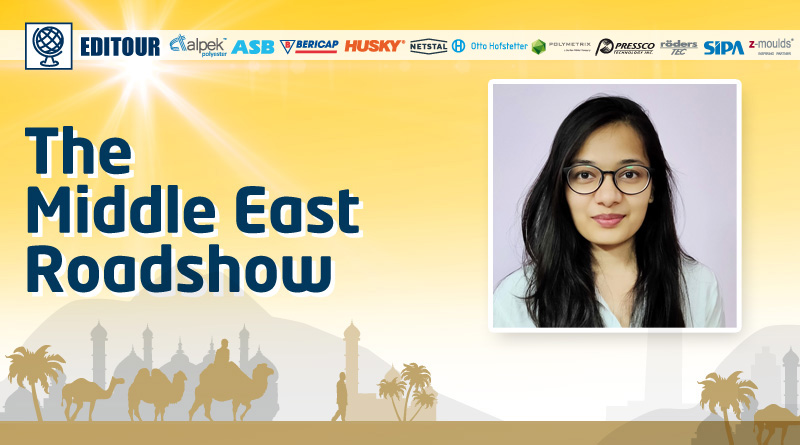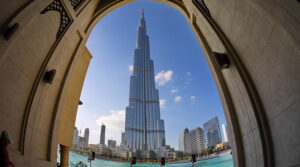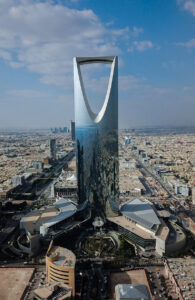The Middle East Road Show begins
PETplanet’s Editour project enters the next round
Late autumn is just the right moment for the start of our Middle East Road Show, the new PETplanet Editour project for 2023-2024. This time, several editors will be visiting our readers along the PET chain in Egypt, Kuwait, Oman, Qatar, Saudi Arabia and the United Arab Emirates to shed light on the local characteristics, trends and developments in the beverage and packaging industries in this part of the world.
Article by Rangoli Gupta, Euromonitor International and Kay Barton, PETplanet
What drives this dynamic region, where tradition and religion go hand in hand with modernity and consumer purchasing power, and what does this mean for the beverage and packaging industry? What are the flavour and rehydration trends in the different countries? What role do sustainability and recycling play? What are the logistical and technological challenges of production, food shelf life and food safety in extreme climates? What are the requirements for packaged beverages in urban centres compared to rural areas? How can target groups be addressed? To discuss all these points, we will be meeting with small and medium-sized players as well as multinational market leaders. Our journey will begin with a visit to the United Arab Emirates, followed by Saudi Arabia.
As an introduction to these markets, we asked Mrs Rangoli Gupta, Research Associate at Euromonitor International, to give a brief overview of the current beverage and PET situation:
Global supply chain challenges of 2022 ripple through the soft drink industry, impacting costs and consumer choices
In 2022, widespread supply chain challenges emerged, driven not only by the enduring effects of the pandemic but also by the Russia-Ukraine war and environmental concerns of the carbon footprint associated with transport. These challenges encompass elevated costs for ingredients like sugar, sweeteners, and coffee, along with increased prices and limited availability of packaging materials such as aluminium, metal, and rPET. Price spikes in energy, labour shortages, and transportation issues have impacted both soft drink manufacturers and consumers, leading to higher unit prices and prompting a re-evaluation of choices and priorities.
Soft drinks face a potential perception of being non-essential due to global inflation, necessitating convenient and cost-effective packaging. Flexible aluminium/plastic and PET bottles are anticipated to witness higher demand post-2022 due to their ease of manufacturing, storage, and affordability. The ongoing decline in cola carbonate sales, attributed to the association with unhealthy lifestyles, is expected to persist, affecting the growth of metal beverage cans in the forecast period as they are the most prominent pack type with 68% share in Saudi Arabia and 72% share in UAE in 2022.
Ain Water launches (rPET) bottles made from 100% recyclable material
In the United Arab Emirates, there is a growing consumer inclination towards sustainability, with individuals actively seeking eco-friendly packaging options. Soft drinks manufacturers are responding to this trend by exploring ways to enhance the sustainability of their packaging to meet consumer expectations. In 2022, Agthia made a significant announcement about the introduction of a new water bottle for its Al Ain Water brand, crafted from rPET. This initiative marked a pioneering effort by a local company and followed the company’s previous launch of water bottles made entirely from plant materials in 2020. Agthia’s introduction of rPET bottles aligns with its commitment to transitioning towards a circular economy. Additionally, the company entered into a Memorandum of Understanding (MoU) with Veolia Middle East subsidiary Repeet and Bee’ah to facilitate the manufacturing, collection, and recycling of rPET. This collaboration involves the establishment of a new 40,000m2 facility in Abu Dhabi, with an annual recycling capacity of 12,000 tonnes of PET. The initiative aligns with the Ministry of Industry and Advanced Technology’s decision to regulate the use of recycled plastic bottles in the circulation of bottled drinking water.
United Arab Emirates-based Coffee Planet launches eco-friendly coffee capsules
The beverage packaging industry has witnessed innovations, such as the introduction of eco-friendly coffee capsules. As the trend of on-the-go coffee consumption rises, coffee capsules offer a convenient and customisable solution for quick coffee preparation. However, a significant drawback is the non-biodegradability of many coffee capsules in the market, contributing to environmental concerns, particularly among the growing number of roasteries in the United Arab Emirates. Addressing this issue, Coffee Planet, based in the UAE, has launched 100% biodegradable and compostable coffee capsules. These capsules, crafted from vegetable-based materials, not only maintain product quality but also readily break down after use. Additionally, Coffee Planet has committed to planting a tree through the Eden Reforestation Project for every eco-capsule sold, demonstrating its dedication to sustainability.
PET bottles dominate still bottled water packaging in Saudi Arabia as glass remains a niche choice for premium brands
Still bottled water remains the biggest category in the Saudi Arabian soft drinks industry, accounting for more than half of the overall packaging unit volumes. This category dominates the usage of PET bottles in Saudi Arabian soft drinks market. With still bottled water expected to continue growing in the coming years, this also means a positive growth trajectory is expected for PET bottles over the forecast period. Glass is regarded as a sustainable packaging option, often chosen by premium juice and nectar brands for its association with superior quality, reflecting positively on the product’s perceived quality. Despite ongoing growth, glass is anticipated to remain a relatively minor packaging choice compared to PET bottles and metal beverage cans. Factors contributing to this include the increasing costs of raw materials and logistics, given that glass is more expensive to produce and challenging to transport due to its susceptibility to breakage.
Sustainable initiatives by other companies
Companies are increasingly moving towards more sustainable packaging in order to keep up with the increasingly environmentally conscious consumers. Vimto Squash launched a “widely recycled” claim on its 1-litre PET bottles in liquid concentrates. Pearl Royal followed a similar strategy for its coconut water, with its coconut-shaped twin packs of 310ml carrying three-step “how to recycle me” instructions on the packaging. Saudi Arabia’s Vision 2030 supports the sustainability drive and companies, including Almarai and Nestlé, have officially pledged to support this commitment in terms of packaging.




